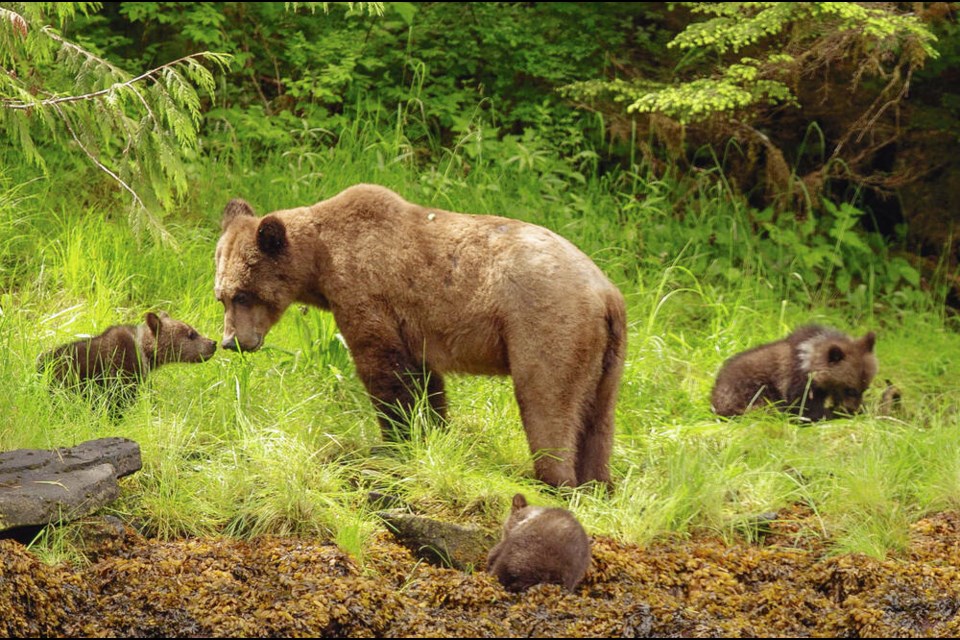A commentary by a former Times Colonist reporter with an interest in environmental issues.
The province wants to know what British Columbians think about management of B.C.’s grizzly bear population and, on one key issue, the government now has unequivocal answers.
British Columbians from across the province are clear they do not want the grizzly bear trophy hunt reopened and that the provincial government should introduce legislation to ensure the current ban remains in place.
The December 2017 ban was brought in after years of bitter political battles and growing public distaste for trophy hunting, when animals are killed for trophies such as their head, hides and paws. The exception is that Indigenous people are allowed to hunt grizzlies for food, ceremonial or social purposes.
The results of a poll by Research Co., conducted in partnership with Pacific Wild Alliance, was released two days before today’s deadline for official public feedback on the province’s draft Grizzly Bear Stewardship Framework, which has the stated aim of improving conservation efforts and identifying knowledge gaps.
The poll of 1,000 adults found that 84 per cent disapprove of hunting grizzlies for trophies or sport and 77 per cent — spanning the entire political spectrum — want the current ban enshrined in legislation. More than four out of five also disapprove of trophy hunting black bears, wolves, cougars and other wild cats.
Opposition to the hunt is highest on Vancouver Island at 79 per cent and lowest in Metro Vancouver with 66 per cent opposed. The margin of error is plus or minus 3.1 per cent, 19 times out of 20.
The findings support a growing unease among conservation groups about the language of the Stewardship Strategy and government’s intentions, especially with pressure to reinstate the hunt from groups such the Guide Outfitters Association of B.C. and the B.C. Wildlife Federation.
A government spokesperson said “the hunt remains closed to all licensed hunting and changes to that approach are not being considered at this time,” but critics say the vague language, lack of emphasis on conservation or habitat protection and references to the ban being an ethical decision rather than one based on science, are raising alarms.
“There’s a big concern that this is a sort of underhanded way of reinstating the grizzly bear trophy hunt,” said Karen McAllister, Pacific Wild executive director.
“They sidestep all the science, or lack of science … We’ve got the second slowest reproducing land mammal in North America, a species listed as special concern under SARA (Species at Risk Act), a species that’s been extirpated from 50 per cent of its original range, so one would think it is not just ethics,” McAllister said.
The province says the focus of the Stewardship Framework is “broader grizzly bear stewardship principles,” but bear biologist Wayne McCrory, founder of the Valhalla Wilderness Society, described it as watered-down science and questioned why the strategy fails to address issues raised in a scathing 2017 Auditor-General’s report that criticized management of the trophy hunt, the lack of a management plan and the need for habitat protection.
“There’s a lack of any action plan in the Framework,” McCrory said.
While the Union of B.C. Indian Chiefs has stated that trophy hunting goes against Indigenous practices, some, such as the Tahltan First Nation in northwest B.C., want the hunt reinstated and the Nisga’a Final Agreement “includes allocation consideration for the purposes of licensed harvest of grizzly bear.”
The Framework acknowledges that, while some Indigenous communities have a deep understanding that grizzly bears should not be hunted and some have benefited economically from bear-viewing, other communities have suffered economic losses from the closure of grizzly hunting.
“Some Nations have expressed interest in reinstating a licensed hunt to provide a source of local income,” it says.
“Should licensed hunting be considered in the future, it would require a more detailed and focused review of Indigenous and non-Indigenous perspectives, science and policy.”
It is language that opens a crack in the trophy hunting door, especially in the north of the province where grizzly populations are slightly healthier.
“I absolutely respect subsistence rights and cultural use of First Nations. I would just hope that they would pursue non-lethal commercial avenues over lethal ones,” McAllister said.
Studies have found that bear-watching is more lucrative and brings more to provincial coffers than hunting.
A major concern with the Framework is a plan to set up regional wildlife advisory boards, which conservation organizations fear could easily be dominated by hunting organizations.
The local committees would be a backdoor way of reinstating the trophy hunt with regional boards deflecting the flak from government, McCrory predicted.
There are also unanswered questions on how decisions by local boards would mesh with provincial legislation.
The question of offloading responsibilities to regional boards got a solid thumbs down from those responding to the Research Co. poll with 76 per cent — more than three out of four British Columbians — agreeing that decisions about the stewardship of grizzly bears should remain in the hands of the provincial government.
The unanswered question now is whether the provincial government is listening.
>>> To comment on this article, write a letter to the editor: [email protected]



